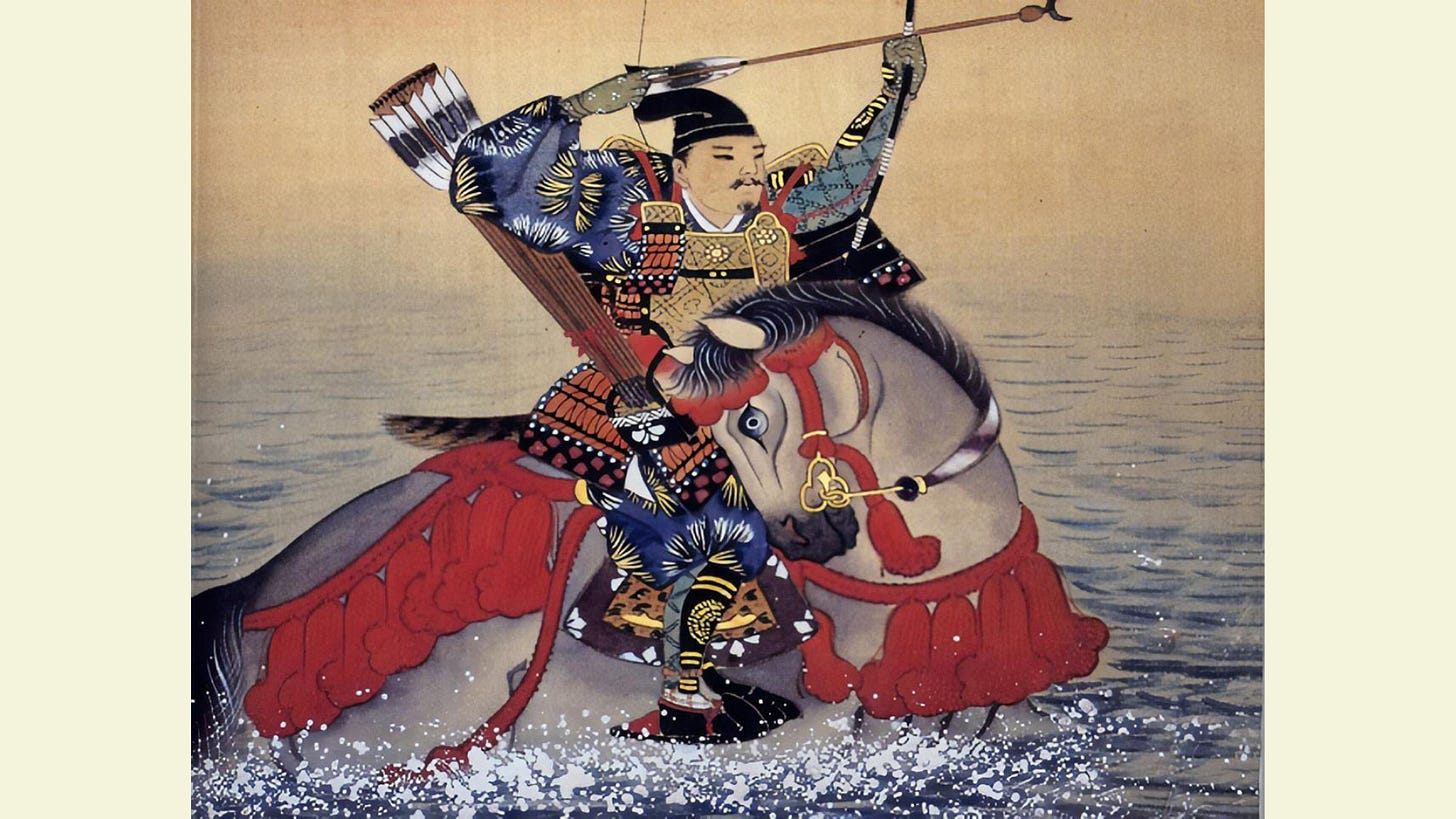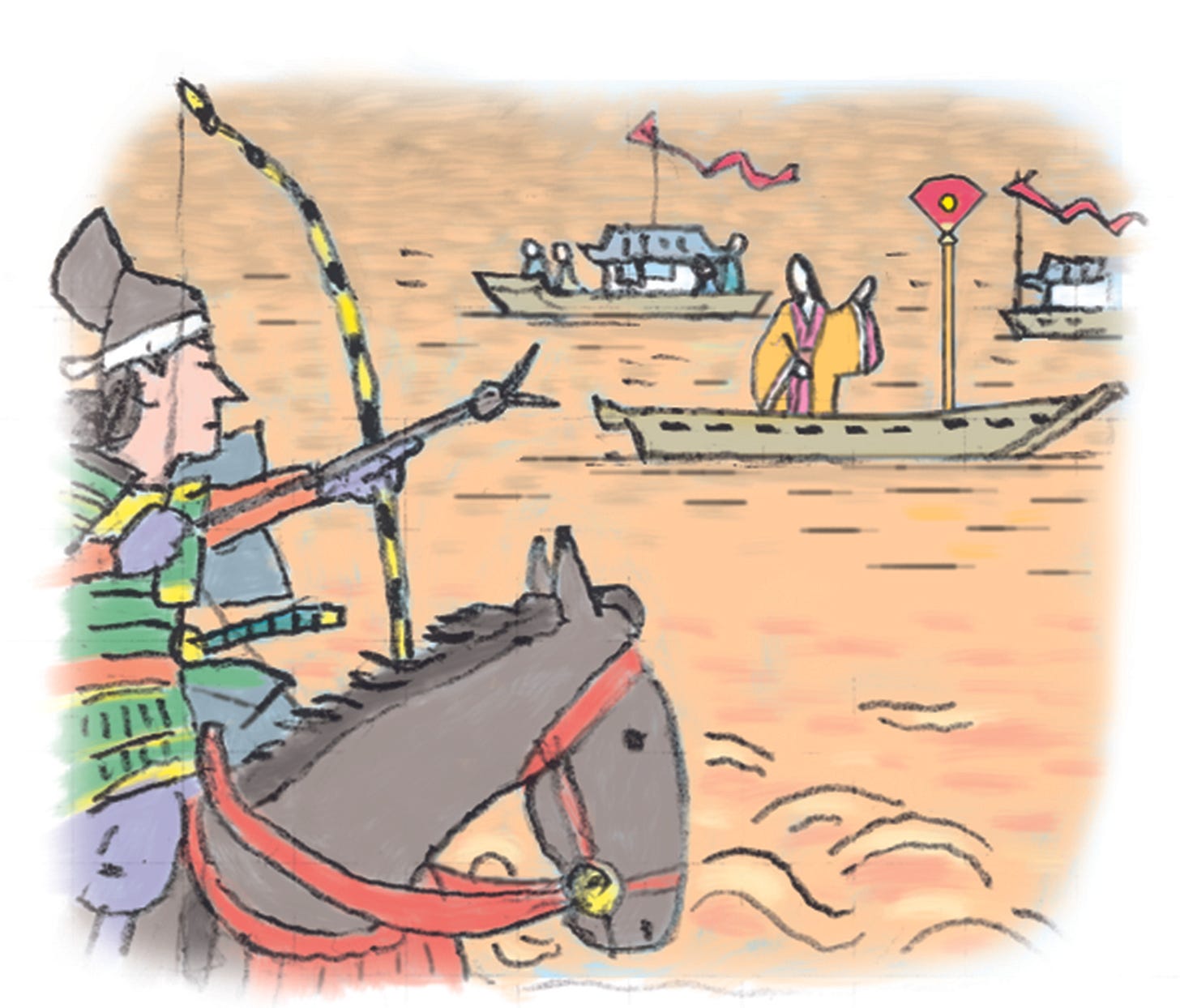The Japanese William Tell: Nasu no Yoichi
Japan’s Most Famous Samurai Archer

那須与一(なすのよいち)が実在(じつざい)したかどうかは不明(ふめい)である。 It is not clear whether Nasu no Yoichi really existed.
しかし、『平家物語(へいけものがたり)』『源平盛衰記(げんぺいせいすいき)』といった書物(しょもつ)には登場(とうじょう)する人物(じんぶつ)である。 However, he appears in books such as "The Tale of the Heike" and "The Rise and Fall of the Genpei."
那須与一の出身(しゅっしん)は、現在(げんざい)の栃木県那須郡(とちぎけん なすぐん)である。 Nasu no Yoichi came from what is now Nasu District in Tochigi Prefecture.
1166年から1169年頃、那須資隆(なす すけたか)の十一男(じゅういちなん)として生(う)まれた。 He was born between 1166 and 1169 as the eleventh son of Nasu Suketaka.
本名(ほんみょう)は宗隆(むねたか)といい、「与一(よいち)」というのは十一男を意味(いみ)する通称(つうしょう)である。 His real name was Munetaka. "Yoichi" was a nickname that meant "eleventh son."
幼(おさな)いころから弓(ゆみ)が天才的(てんさいてき)に上手(じょうず)だった。 He was a genius at archery from a young age.
那須与一が11歳のころ、源義経(みなもとの よしつね)がたまたま与一を見(み)かけた。与一の父親(ちちおや)が、兄(あに)の十郎為隆(じゅうろう ためたか)と与一を源氏の兵(へい)として従軍(じゅうぐん)させることを義経と約束(やくそく)した。 When Yoichi was 11, Minamoto no Yoshitsune happened to see him. Yoichi’s father promised that his sons, Jurotametaka and Yoichi, would join the Genji army.
当時、日本の武士(ぶし)は源氏と平家に分(わ)かれて対立(たいりつ)していた。 At that time, Japanese samurai were divided between the Genji and the Heike clans.
那須与一の他(ほか)の9人の兄たちは平家側についたが、末(すえ)っ子の2人は父親によって源氏に差(さ)し出された。 Nine of Yoichi’s older brothers joined the Heike, but the two youngest sons were sent to the Genji by their father.
このとき父親が何(なに)を思(おも)っていたのかは不明である。 No one knows what the father was thinking at that time.
しかし、後に那須与一が活躍(かつやく)し、源頼朝(みなもとの よりとも)から領土(りょうど)を賜(たまわ)って那須家の当主(とうしゅ)となったとき、敗(やぶ)れた平家側についていた兄たちを許(ゆる)し、領土を分(わ)け与(あた)えた。 Later, Yoichi became famous and was given land by Minamoto no Yoritomo. When he became the head of the Nasu family, he forgave his brothers who had sided with the Heike and shared land with them.
さて、那須与一の名を後世にも有名にしたエピソードがある。 There is a story that made Nasu no Yoichi famous even after his time.
「扇(おうぎ)の的(まと)伝説(でんせつ)」である。 It is the legend of the "fan target."
1185年、現在の香川県高松市(かがわけん たかまつし)あたりで起(お)こった屋島(やしま)の戦(たたか)いでの出来事(できごと)である。 This happened in 1185, during the Battle of Yashima, near today’s Takamatsu City in Kagawa Prefecture.
2月18日、その日は日(ひ)が暮(く)れかけていたので、源氏も平家もその日の戦いを終(お)わりにしようとしていた。 On February 18, the sun was setting, and both sides were about to end the battle for the day.
沖の方から、美しく飾(かざ)られた小舟(こぶね)が岸の方へやってきた。 A small, beautifully decorated boat came from the sea toward the shore.
舟の上の若い女性(じょせい)が、日輪(にちりん)が描(えが)かれた真っ赤(まっか)な扇を舟の櫂(かい)にはさみ立て、陸に向かって手を振(ふ)った。 A young woman on the boat placed a bright red fan with a sun drawn on it onto a paddle and waved toward the land.
源氏の大将(たいしょう)である義経は意味が分からず、後藤実基(ごとう さねもと)に「あれは何だ」と尋(たず)ねた。 Yoshitsune, the Genji leader, didn’t understand and asked Goto Sanemoto, “What is that?”
実基は、「射(い)よ、ということでしょう。ただし、あの女性を大将軍(だいしょうぐん)であるあなた様が見とれている隙(すき)に、腕(うで)の立つ射手(いて)があなたを狙(ねら)って射落(いお)とそうとしているのではないかと思います。しかし、扇は射るのがよろしいかと」と答えた。 Sanemoto replied, “It means they want you to shoot it. But maybe, while you watch the woman, a skilled archer is waiting to shoot you instead. Still, I think you should try to shoot the fan.”
扇までの距離(きょり)はおよそ75メートル。しかも扇のある小舟は波で揺(ゆ)れていた。 The fan was about 75 meters away, and the small boat was rocking in the waves.
源氏の兵士(へいし)たちは尻込み(しりご)みした。 The Genji soldiers were afraid to try.
武士にとって面目(めんぼく)は命と同じである。 For a samurai, honor is as important as life.
的(まと)に当(あ)てられなかったら、大将(たいしょう)である義経(よしつね)に大(おお)きな恥(はじ)をかかせることになる。 If they missed, they would disgrace their leader, Yoshitsune.
挑戦(ちょうせん)して当(あ)てられなかった場(ばあ)合(あい)、生(い)きて故郷(こきょう)に帰(かえ)ることなどできないだろう。。 If they failed, they might never return home alive.
切腹(せっぷく)を覚悟(かくご)して、矢(や)を放(はな)たなければならなかった。 They had to be ready to commit seppuku (ritual suicide) if they failed to shoot the fan.
義経(よしつね)は与一(よいち)に射(い)るよう命(めい)じた。
Yoshitsune ordered Yoichi to shoot.
北風(きたかぜ)が吹(ふ)き、波(なみ)も高(たか)く、小舟(こぶね)は激(はげ)しく揺(ゆ)れていた。
A strong north wind blew, and the small boat rocked wildly in the waves.
与一(よいち)は祈(いの)りながら目(め)を閉(と)じた。目(め)を開(あ)けると、風(かぜ)は弱(よわ)まっていた。
Yoichi closed his eyes and prayed. When he opened them, the wind had calmed.

与一(よいち)は神経(しんけい)を集中(しゅうちゅう)させ、矢(や)を放(はな)った。
He focused deeply and released his arrow.
矢(や)は海(うみ)に落(お)ち、扇(おうぎ)は空(そら)高(たか)く舞(ま)い上(あ)がった。
The arrow hit, and the fan flew high into the sky.
敵(てき)である平家(へいけ)も、味方(みかた)の源氏(げんじ)の兵士(へいし)たちも大歓声(だいかんせい)を上(あ)げて与一(よいち)をたたえた。
Both the enemy Heike and the Genji soldiers cheered and praised Yoichi.
平家(へいけ)も源氏(げんじ)も武士(ぶし)である。しかし、平家(へいけ)は貴族(きぞく)のような暮(く)らしをしてきた者(もの)たちである。つまり平家(へいけ)は遊興(ゆうきょう)を好(この)む者(もの)たちであった。
The Heike and Genji were both samurai. But the Heike lived like nobles and enjoyed entertainment.
この扇(おうぎ)の騒(さわ)がいで盛(も)り上(あ)がり、平家(へいけ)の50歳(ごじゅっさい)ぐらいの男(おとこ)が扇(おうぎ)があった場所(ばしょ)に立(た)って長刀(なぎなた)を持(も)って踊(おど)り出(だ)した。
The Heike were so entertained that a man around 50 stood where the fan had been and began to dance with a long weapon called a naginata.
山(やま)で育(そだ)った義経(よしつね)にはなぜこの場面(ばめん)で平家(へいけ)が踊(おど)っているのか理解(りかい)できなかった。戦(いくさ)の最中(さいちゅう)に何(なに)をふざけているのだと思(おも)った。
Yoshitsune, who had grown up in the mountains, didn’t understand why the Heike were dancing during battle. He thought they were playing around.
義経(よしつね)が命(めい)じて、与一(よいち)はその男(おとこ)を射殺(しゃさつ)した。
Yoshitsune gave the order, and Yoichi shot and killed the man.
平家(へいけ)の者(もの)たちは静(しず)まり返(かえ)った。源氏(げんじ)の者(もの)たちはどよめいた。「よ(く)射(い)た」と感心(かんしん)する者(もの)たちと、「なん(と)ひどいことをするのだ」という者(もの)たちがいた。
The Heike fell silent. The Genji soldiers murmured—some said, “What a great shot,” while others said, “That was terrible.”too cruel.”
Vocabulary List
義経(よしつね) – Yoshitsune – Leader of the Genji army.
与一(よいち) – Yoichi – A very good archer from the Nasu family.
射(い)る – to shoot – To use a bow and arrow.
扇(おうぎ) – fan – A fan used for decoration in this story.
命(めい)じる – to order – To tell someone what to do.
矢(や) – arrow – A long stick with a sharp point used in a bow.
祈(いの)る – to pray – To ask a god for help.
風(かぜ) – wind – Air that moves.
揺(ゆ)れる – to shake / to rock – To move again and again.
集(しゅう)中(ちゅう)する – to focus – To think hard about one thing.
舞(ま)い上(あ)がる – to fly up – To go high into the air.
兵士(へいし) – soldier – A person who fights in a war.
敵(てき) – enemy – The people you fight against.
味方(みかた) – ally – The people on your side.
歓声(かんせい) – cheer – A loud happy sound.
踊(おど)る – to dance – To move your body to music.
戦(いくさ) – battle / war – A big fight.
ふざける – to play around – To act in a silly or not serious way.
射殺(しゃさつ)する – to shoot and kill – To kill someone with a bow or gun.
静(しず)まり返(かえ)る – to fall silent – To become very quiet.
感心(かんしん)する – to admire – To think something is great.
Subscribe to keep reading. I appreciate your support!
This article is copyright ©. Sharing the link is welcome, but copying without permission is not allowed. Educational use is welcome.
Sources:

